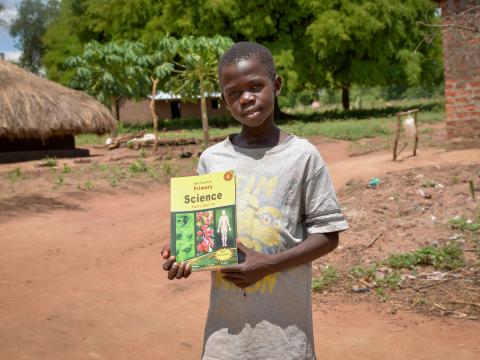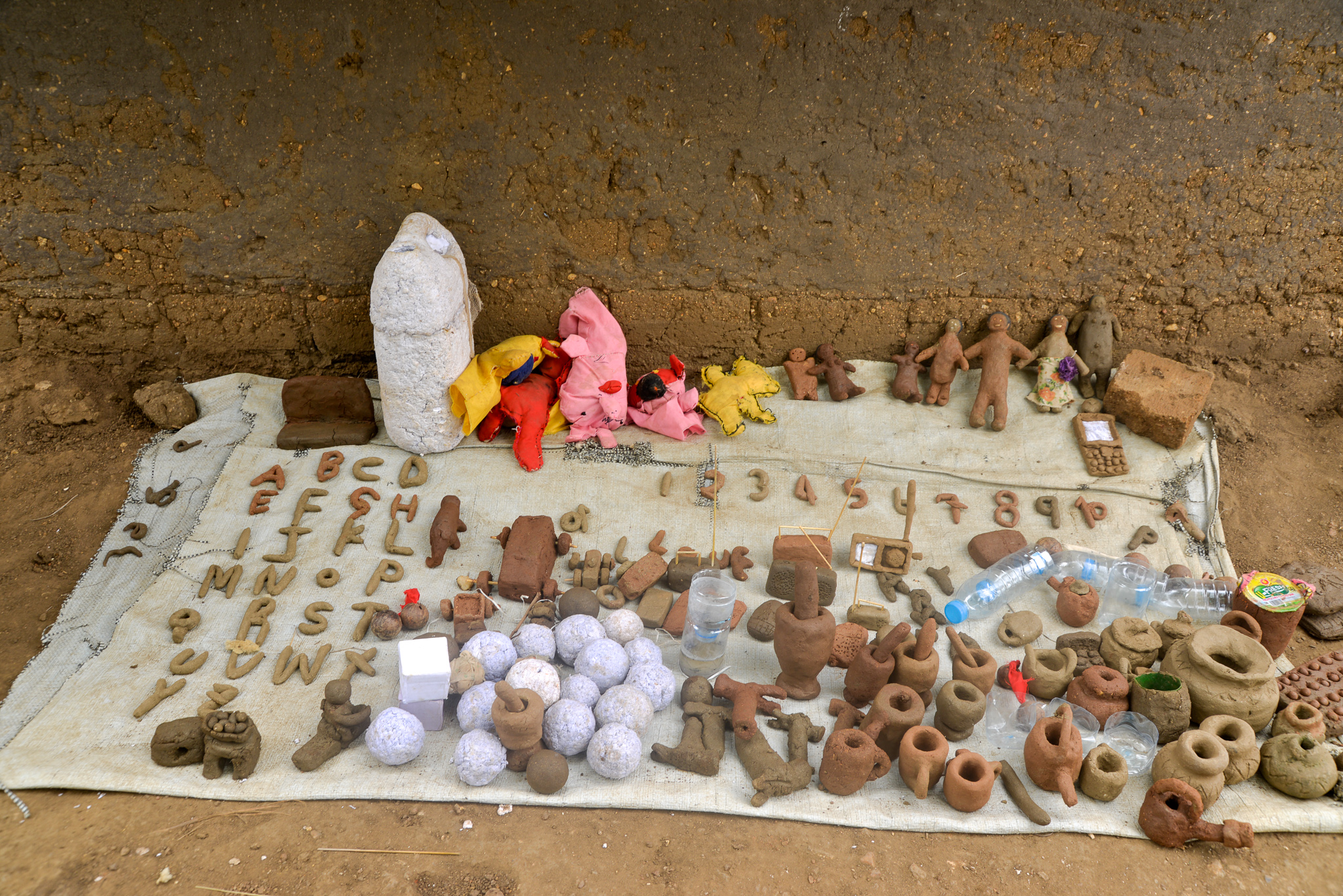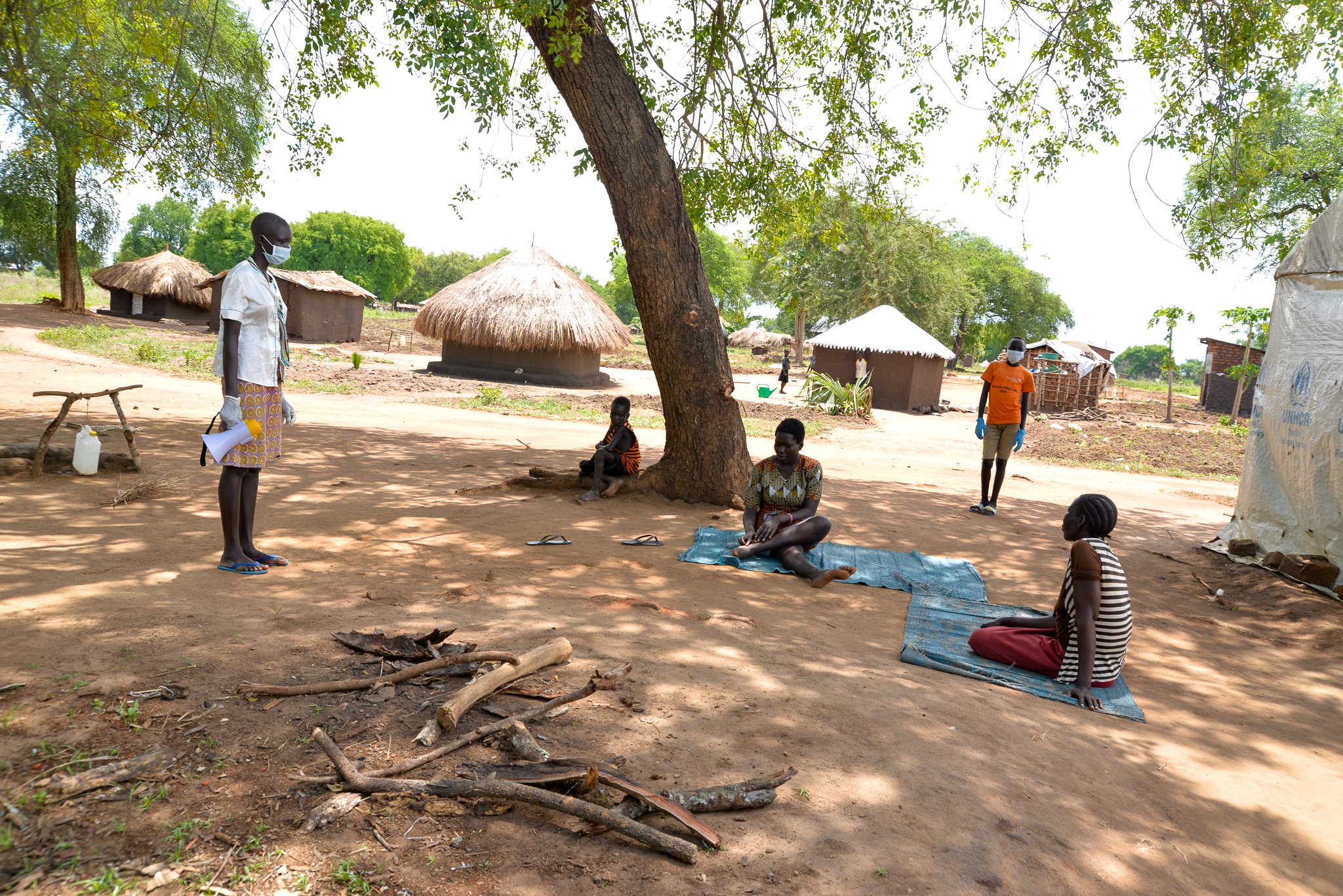Refugees creating a fun environment for children to learn during lockdown

By Derrick Kyatuka, Communications Officer, West Nile Refugee Response
Play is essential in the growth of children. As they play and have fun, children develop emotionally, intellectually and socially. Language is also developed as children interact and play.
As the COVID-19 pandemic continues to ravage countries globally, children who have always enjoyed playing with friends in schools during early childhood development have been denied this great opportunity as they remain confined in their homes as a preventive measure against the deadly virus.
According to United Nations Educational, Scientific and Cultural Organisation (UNESCO), about 1.52 billion children globally are out of school because of the pandemic. This has forced many countries to adopt alternative teaching methods including online through digital media, through radios and television.
The Government of Uganda, through the Ministry of Education & Sports, is working with heads of primary and secondary schools to identify model teachers to prepare remedial learning to be delivered on radio and television stations across the country.
In Uganda, the lockdown has kept 2,050,403 young children out of early learning development centres; 10,777,846 out of primary school and 1,986,362 out of secondary schools.
Although the government has tried to reach out to children during the lockdown, the majority of children, especially in refugee settlements where World Vision operates, have not greatly benefited from this teaching innovation. Most of them do not have access to radios and television, and where they can, they face a language barrier. Some creative parents, however, have found a way to engage their children in the lockdown.
Children coping with education
Simon Taban, a South Sudanese refugee and caregiver with World Vision at one of the Child Friendly Spaces in Imvepi Refugee Settlement, is teaching his children at home how to read and write. The father of seven uses moulding to make his children learn as they play. They mould different objects using soil from the compound – mixing it with water to form mud.
“In August last year, World Vision trained us in making play materials locally. I didn’t know that the skills we acquired would be of great importance months later. When a directive was issued to close all schools, I started thinking of how I would make my children continue learning from home and one of the ideas I came up with was moulding,” Taban says.
He started engaging his children a week after the lockdown was announced. “During community awareness sessions about the virus, we were told that people should avoid unnecessary movements in the community and the only way I would keep my children at home was through engaging them in fun activities like moulding.”
Taban says he draws objects on paper and then instructs the children to mould them. This has also helped him to create a strong bond with his children.
“We do most of our learning in the local language because the younger children don’t understand English. This creative way of teaching has helped them to develop their intellectual ability because they understand objects and what purpose they serve like pots, radios, cars, mortar and pestle, among other things. They always look forward to moulding sessions because they enjoy it,” he adds.
Loyce, 14, Taban’s firstborn daughter, helps her father in guiding her siblings during the moulding sessions. Loyce has helped to mould letters of the alphabet and numbers that her young siblings can read during study time.
“At first, our father told us to mould anything of our choice but most of what we moulded that included cars, radios and pots was not good. On the following day, he asked us to mould things that resemble play items at school. With his help, I managed to mould letters of the alphabet and numbers 1 to 10,” says a smiling Loyce.
“Moulding is fun and it keeps us busy at home because we are always challenged to mould something new. I also guide my siblings how to mould. The ones who are yet to join school can now read letters, numbers and identify objects,” Loyce adds.
Taban is not alone. World Vision has reached 784 refugee households and 42 host community households with this creative approach to make homes friendly for children to learn during the lockdown.
Cosmas Lege, a father of five, says although his children miss playing with their friends at the Child Friendly Spaces, homemade play items have provided some level of fun to his children as they learn.
“I used the skills from World Vision training to make wooden play items and dolls for my children. That’s the only way I can keep them at home with little boredom. Radio lessons are in English and children cannot understand. I keep engaging them so they do not forget what they were taught in school. We pray for the lockdown to end and our children get the best education in school,” Lege notes.

Santos, 16, borrows textbooks from his neighbour with whom they share a compound. Reading them has helped him revise.
“I have been revising books that I borrowed from my friend with whom we are in the same class, but attend different schools. After doing housework, my parents make sure that I revise my books before playing with my siblings. My hero in the fight against the spread of the virus is the President of Uganda because he keeps giving us information on how to protect ourselves,” Santos says.

Dilis Alele, the World Vision Child Protection facilitator in Imvepi Refugee Settlement, says parents and caregivers were trained last year under a UNICEF-funded project on how to produce basic learning and play materials locally for children.
The parents are now using the acquired skills to provide basic early childhood learning at home to enable their children’s cognitive ability to develop.
“Psychosocial support has to continue even in the lockdown and we are encouraging parents to develop play materials especially for indoor games since children cannot access structured play materials at the Child Friendly Spaces. Homes must be friendly enough for children not to be stressed and traumatised and this can be achieved through play,” Alele notes.
“Basic education can also be achieved if parents and older children in the home are actively involved to instruct the young ones on what to do. This will help to develop the intellectual ability of children as we wait for normalcy to resume,” says Alele.
Learn more about and/or support World Vision’s global work to limit the spread of COVID-19 and support the children impacted by it on our COVID-19 Emergency Response Page.